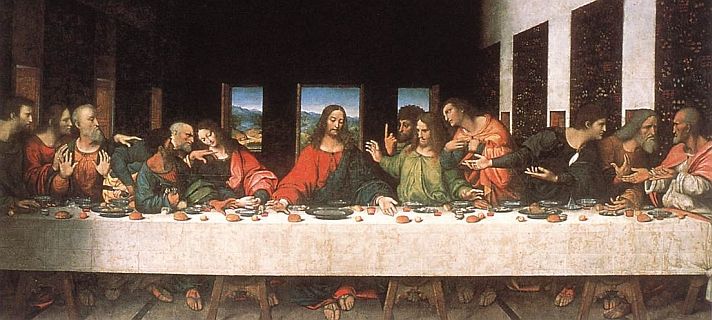[fbshare type=”button” float=”right” width=”100″] By Lawrence Feingold

By becoming man, the Second Person of the Blessed Trinity was able to teach us perfect virtue not only through a law but also through the example of His human words and actions, especially in His Paschal mystery.
Does this continue in the Eucharist? As in all the mysteries of His human life, Christ’s Eucharistic presence is also a model of virtue, especially of charity, humility, and obedience.19 First of all, charity is the gift of self for the sake of the loved one, and the Eucharist is precisely that. It is Christ who performs an incomprehensible miracle, every day, in every locality where there is a Catholic priest and a church, in order to give Himself to us as the Bridegroom of our souls.
Charity seeks not its own. The Eucharist adds nothing to Jesus, but is entirely for our benefit. Christ present in the Eucharist is absolutely disinterested, for He is there entirely for us, for our welfare. Christ’s Eucharistic presence on our altars and in our tabernacles, day and night, adds nothing to Him, but everything to us. He is the divine “prisoner of the tabernacle” in order to be able to be with us whenever we wish it, to be available to give us the consolation of His presence whenever we need it, desire it, and seek it, whenever we thirst for the face of God when all other consolations have run dry in this place of exile, this valley of tears.
Charity seeks no price. The Eucharist gives us the greatest treasure of the universe, free for the taking. Charity is patient. Jesus in the Blessed Sacrament endures all abuse, all irreverence, all sacrilege, with the utmost meekness, for the sake of being perpetually present as divine Victim in our midst. Charity is delicate and discreet. Christ in the Blessed Sacrament does not impose Himself on anyone, but He is always there when we wish to pour out our hearts to Him.
Charity condescends to the level of the person loved so that the beloved feels no humiliation or intimidation. Could there be a greater example of the kindness of condescension than the Blessed Sacrament? Christ puts a veil on all of His divine and human greatness and appears under the humble and common species of bread and wine. If He appeared in all His glory, as on Mount Tabor, we would be overawed and afraid. This condescension of Christ in the Eucharist thus serves to arouse us to respond to His charity with the greatest of confidence.
Finally, charity bears all things. In the Blessed Sacrament, Jesus allows Himself to be received by those who have lost their faith in His presence and His divinity, by those in a state of mortal sin, by those who could not care less about Him, by those who knowingly commit sacrilege. He permits this because He maximally respects our free response to His love and because He remains faithful even when we are unfaithful.
The Blessed Sacrament is the perfect model of humility, self-abnegation, and poverty. Christ, being God, is humbled even more by His sacramental state in the Eucharist than He was in Bethlehem or Calvary. In Bethlehem and Calvary, He veiled His divinity so that only His weak and vulnerable humanity would be seen by men, and seen in an attitude of humiliation. However, in the Blessed Sacrament, even His sacred humanity is veiled under the species of ordinary bread and wine. He foregoes not only the appearance of the omnipotent power which He possesses as God; He also foregoes the beauty of His sacred humanity. This is the utmost extreme of poverty as well. He has divested Himself not only of all possessions, as on Calvary, but even of the appearance of His human nature.
Humility entails hiding our talents and gifts if we can do so without loss to our neighbor. What better model of this than the Holy Eucharist, where the King of glory, the Creator of the world, appears as if He were but a piece of bread or a bit of wine! This divine self-abnegation is greater than that revealed in Bethlehem, or even on Calvary, where the centurion or the good thief could see the ineffable nobility of the suffering of the Son of God.
Finally, Christ in the Blessed Sacrament is the most perfect model of obedience. As He was obedient in Nazareth to St. Joseph and Mary and on Calvary to His executioners, so likewise in the Eucharist He is perfectly and perpetually obedient, submitting to His priests until the end of the world. Christ obeys His priests absolutely and unconditionally in the Blessed Sacrament. He comes when they validly consecrate, and He stays present until the sacred species of the bread and wine are digested or corrupted. He comes regardless of whether the ceremony is solemn or simple (as long as it is valid). He comes whether or not the priest or the communicant is in a state of grace. His obedience and humility is such that He remains present even in the face of great and willful sacrilege.
Dr. Lawrence Feingold is Associate Professor of Theology and Philosophy at Kenrick-Glennon Seminary in St. Louis. He is the author of numerous scholarly books, including The Eucharist: Mystery of Presence, Sacrifice, and Communion, a comprehensive commentary on the mystery of the Eucharist drawing from Scripture, the Church Fathers, and magisterial teaching throughout the ages.